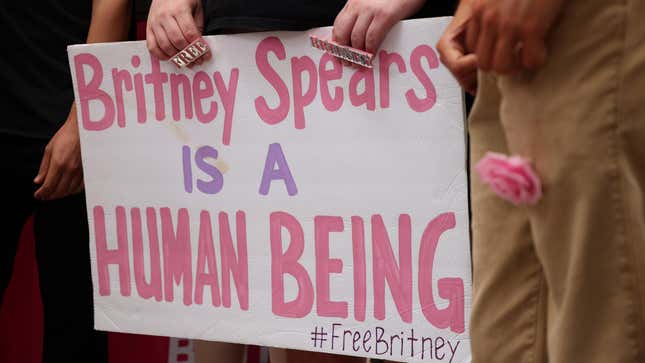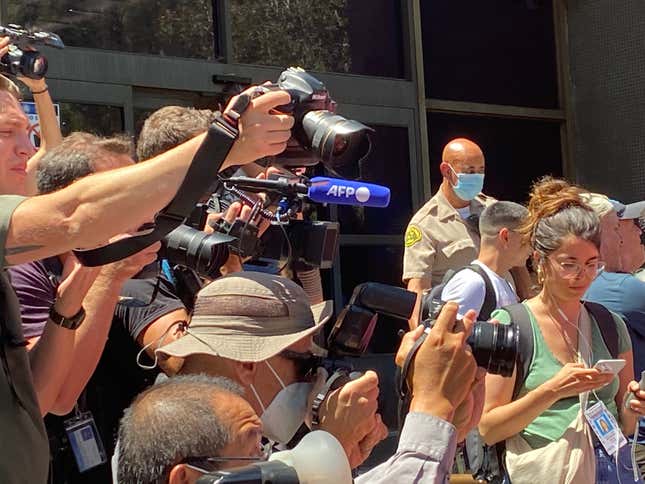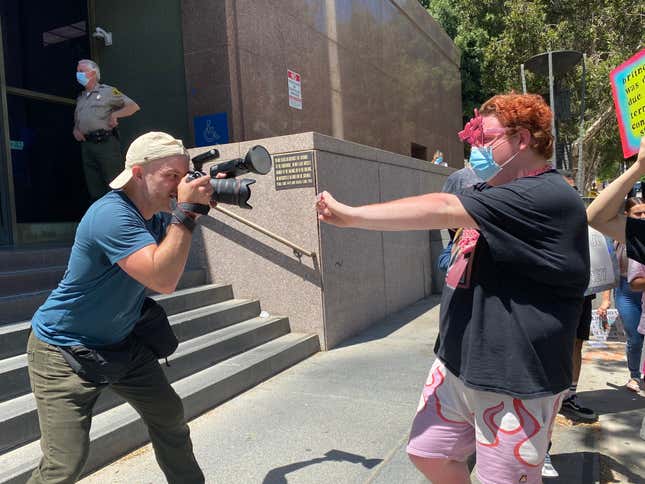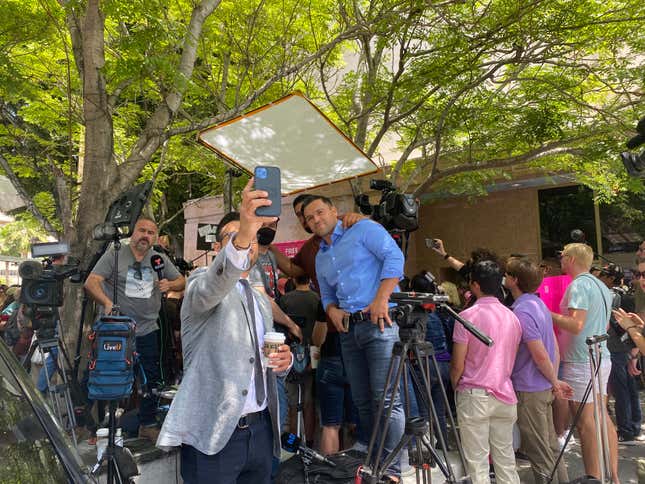The Bleak and Necessary Media Circus Around Freeing Britney
In court, Britney Spears testified publicly before a judge about her conservatorship for the first time since the media nearly killed her in 2008
Celebrities

LOS ANGELES — I felt disgusting as I approached the crowd outside the Stanley Mosk Courthouse, where fans gathered on Wednesday to demand Britney Spears’s freedom from a 13-years-long conservatorship and the media gathered to film, to borrow from Britney herself, the circus born of the public outcry for that freedom.
A comment beneath a poster I’d found on Twitter for the rally said that we would meet at 1:30 p.m. on June 23 for a Free Britney protest on the “Performance Lawn” of Grand Park, outside the courthouse set to hold the hearing. But when I reached the performance lawn it was boarded up for repairs, and so I wandered across a giant stretch of the 12-acre park in the brutal Los Angeles sun as sweat cascaded down my sides, watching children play near the fountain, office-skirted women eat their lunches, wondering where the fuck everyone was. When I rounded the corner at West 1st Street, I finally saw: A giant throng of reporters, dozens, video rolling, cameras flashing, boom mics pointed at a stage situated around a cardboard cutout of Britney, where a handful of speakers said things I couldn’t hear over the din. The flashing, the media circus, the hunger for a story about Britney’s misery was so much like 2008, when Rolling Stone declared Britney Spears an “inbred swamp thing” for failing to wear shoes into a gas station, that I very nearly turned around and went home to clean myself up, and would have if I hadn’t promised my own editor a story.

In court, Britney Spears testified publicly before a judge about her conservatorship for the first time since the media nearly killed her in 2008. In those days, many of the very publications outside the courthouse filming her plea for freedom built a multi-million dollar industry out of chasing her car around Los Angeles and yelling questions at her or filming the two times police were called to her home to place psychiatric holds. Since those publications first reported hundreds of gleeful stories about that mental health crisis, Britney says she has been sentenced by the legal system to over a decade of abuse at the hands of her father. She says she’s been forced to work seven days a week, to take lithium against her will, to have an IUD inserted that she is unable to remove. Her passport has been taken away, she says, and she has no access to her $60 million fortune, yet must pay her father $16,000 a month, not to mention his business expenses, the cut he gets of all of her business deals, and the lawyers she is legally obligated to pay on his behalf even as they argue for her prolonged captivity.
But besides dedicated fans and the podcasters responsible for Britney’s Gram, which first reported leaked allegations of abuse, the media, having helped put Britney in this position, has been largely silent for more than 10 years about the gothic horror story of a grown woman locked into the legal, total control of her terrible father, until a New York Times and Hulu special in 2020 first legitimized concerns that Jamie Spears once brushed off to the press as the hysterical ravings of conspiracy theorists.

It is just after 1:30 p.m., and I can just make out a handful of speakers on a platform in the center of what seems like a hundred reporters blocking access to those speakers, filming and talking amongst themselves or to their own cameras so I can’t hear. A handful of fans are being asked their favorite Britney Spears songs by news outlets like iTV. Finally, I see two men standing off to one side without a camera or microphone shoved into faces covered by masks featuring mosaics of Britney Spears’s perfect white smile, and I tentatively approach to ask them why they’re here. One is shy, he says, and doesn’t really want to talk, but his boyfriend chimes in and explains that he’s here to support his partner, a lifelong Britney fan, though he does absolutely agree that the conservatorship is wrong. His partner adds softly that he grew up gay and lonely in a town around the size of Kentwood, Louisiana, where Britney is from. Britney Spears has felt like an older sister since she released her first album about the time he was in the first grade, and he wanted to do what he could to help, which was to show up.
“How will you feel if they lift the conservatorship and we never hear from Britney anymore?” I ask him.
“She deserves that,” he tells me.
-

-

-

-

-

-

-

-

-

-

-

-

-

-

-

-

-

-

-

-

-

-

-

-

-

-

-

-

-

-

-

-

-

-

-

-

-

-

-

-









































